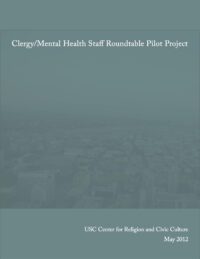Virtually every clergy and MH staff stated that they participated in the Roundtable because they wanted to 1) build supportive bridges between clergy and MH staff, 2) obtain knowledge and insight into the role that each professional plays in serving the community, 3) exchange information about available resources for consumers, and 4) expand their opportunities for collaborative consumer care.
Many MH staff sought practical strategies to assist client care. For example, one clinical psychologist who oversees a caseload of 300-400 consumers, joined the Roundtable because she wanted to gain insight from clergy on how best to deal with religiously-based resistance to treatment. She said,
I work with chronic psychotic disorders primarily…and you get a lot of things like, “I don’t need medication; God will save me,” or “I don’t need to come to you; I go to my church”. So just trying to come up with a way of us working together to understand how we can say, “It’s great that you have your faith and that you believe in God, but it’s also OK to take your medicine.”
An MH staff person who directs a DMH contracted agency said that he felt that the people who agreed to participate in the Roundtable did so because they recognized their own limitations, as well as the benefits of collaboration.
People who joined this, it seems to me, came in with a similar intent. We know we have a community with unending needs to serve. We know that sometimes those needs exceed our training and perspective, and if we’re going to be able to serve people in a culturally relevant way, it will need to include being able to help connect them to others that are going to meet different aspects of the need, whether it’s spiritual needs or health needs.
The desire to learn was also a motivating factor for many. As one MH staff put it, “My main expectation was to learn from clergy and learn their point of view in terms of mental health…” This desire to learn from others was similar for this clergyperson:
I saw it as an opportunity to increase my understanding of psychological issues and…to also share whatever insight I could share with those at the Roundtable about the Catholic Church’s understanding of mental illness.
While overall, members participated because they wanted to increase their knowledge base, they also wanted to help educate others and thereby reduce stigma related to mental health issues. One MH staff related this desire this way:
In a lot of cases mental health has been stigmatized, and one of my aims is to help destigmatize and help educate people more about mental health, how one can work with it and how it’s not only just the part of your physical health, but it’s a part of your whole being.
Although most people attended the Roundtable with a very clear idea of what they hoped to gain, others didn’t have a specific objective in mind. For example, when asked what he had hoped to gain by participating in the Roundtable, one clergy member replied, “I didn’t know. I just knew that I needed to be there”. Another clergyperson added that he didn’t have a predetermined set of expectations for the Roundtable, rather, “I went in to see what it was all about.”
Additional Motivating Factors
While the overwhelming majority of those we interviewed seemed to share the bridge-building vision of the Roundtable, some had at least initial motivations that evidenced different priorities. For example, one clergy person saw the Roundtable as an opportunity to share her religious views with an eye toward proselytizing. When asked what she was gaining from the Roundtable she said, “I’m so grateful for this opportunity to be in that Roundtable. I’m getting something that I’ve prayed for: an opportunity to bring [the religious perspective] that I’ve been given to any [setting]”. While she came to the Roundtable to give her particular religious perspective to the group, she did not see it as a place where she was able to receive much in return. When she was asked if she had gained anything that would help her in her work, she replied, “Not really. I have to be honest with you”. It is important to note however, that regardless her motivating desire to bring her religious perspective to bear on the Roundtable, she never advanced any proselytizing activity during the Roundtable sessions. We do not know whether she pursued such activities outside of the Roundtable setting.
Another clergy member gave evidence of another type of motivation for participating in the Roundtables; he thought it would be a place in which he would receive the training necessary that would allow his congregation to be a grant funded service provider for DMH. However, when he saw that the forum was geared more towards conversation than compensation, he stopped attending. He related his reasoning:
I don’t think we ever got into the specifics of what I really wanted to deal with there. We talked about a lot of things, but we never really got into the specific training, which I brought up a couple of times, that I could not continue to meet on a regular basis talking about whatever. I needed training. That’s the only thing I was interested in, the group providing training and funding.
